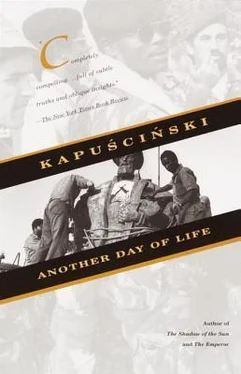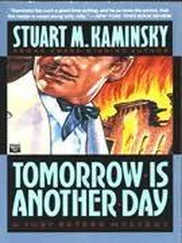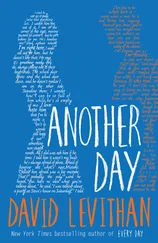Better luck (if that’s the right word — I doubt it) attends Dom Francisco Amarel Reis, owner of the Caminho ao Céu (Road to Heaven) firm, concealed discreetly in a side street at the edge of the city center. His specialty: crosses, caskets, foil flowers, funeral accessories. These days there are many deaths, since fear, despair, and frustration lead people to the grave. There is a multitude of tragic automobile accidents here because the general atmosphere of rout, defeat, rage, and entrapment turns every susceptible driver into a beast. So we have funeral after funeral.
I am writing about people to whom Dona Cartagina introduced me. The old lady was the guardian spirit of the hotel and she wanted to arrange everything. She was the only person interested in Dona Amanda’s gowns, because she was conjuring up a vision of the wedding of Maria and Arturo. She argued with Dom Francisco about the cost of Dona Esmeralda’s funeral, because Dona Esmeralda wouldn’t come out of her coma. Only to the bookstore did I go alone, because I like to spend time in the company of books.
We buried Dona Esmeralda in a cemetery on a steep slope above the sea. The cemetery is as white as if covered by eternal snow. Needlelike cypresses, almost dark blue in the sunlight, shoot up heavenward out of the snow. The gate is painted blue, a warm and optimistic color in this case, suggesting that those who come here march heavenward like the saints in Louis Armstrong’s song.
The next day Dom Silva, the crotchety miser with the suit full of diamonds, left. Later I took Maria and Arturo to the airport.
Now several planes a day — French, Portuguese, Russian, and Italian — were flying. The pilots would get out and look around the airport. I watched them, amazed at the thought that only a few hours before they had been in Europe. I looked at them as at people from another planet. Europe — that was a distant, unreal point in a galaxy whose existence could be proved only by complicated deduction. They flew out in the evening. The overloaded machines crept to the runway, gained altitude with difficulty, and disappeared among the stars.
The nomad city without roofs and walls, the city of refugees around the airport, gradually vanished from the earth. At the same time, the wooden city deserted Luanda and waited in the port for its long journey. Of all the cities on the bay, only the stone Luanda, ever more depopulated and superfluous, remained.
That was the beginning of October. The city was becoming more desolate each day. Starting in the morning I wandered the streets without aim, without purpose, until the crushing heat drove me back to the hotel. At noon the sun beat against my head; it became so close and hot that there was nothing to breathe. Summer was beginning and the gates of a tropical hell were opening. Water was running short because the pumping stations were situated on the front lines, and after each repair they were destroyed again in the course of the fighting. I walked around dirty, needing something to drink so badly that I came down with a fever and saw orange spots before my eyes.
More and more merchants closed their shops. Black boys drummed with sticks on the lowered metal shutters. Restaurants and cafés were already out of action; chairs, tables, and folded umbrellas stood around on the sidewalks and afterward disappeared into the African slums. From time to time some car would drive through the empty streets, running the red lights that kept functioning automatically, God knows for whom.
At about this time, someone brought news to the hotel that all the police had left!
Now Luanda, of all the cities in the world, had no police. When you find yourself in such a situation, you feel strange. On the one hand everything seems light, loose, but on the other hand there is a certain uneasiness. The few whites who still wandered the city accepted the development with foreboding. Rumors circulated that the black quarters would descend upon the stone city. Everyone knew that the blacks lived in the most awful conditions, in the worst slums to be seen anywhere in Africa, in clay hovels like heaps of smashed cheap pottery covering the desert around Luanda. And here stood the luxurious stone city of glass and concrete — empty, no one’s. If only they would come peacefully, in an orderly way, with their families, and occupy what was abandoned and vacant. But according to the terrified Portuguese who passed themselves off as experts on the native mentality, the blacks would burst in, swept up in a madness of destruction and hatred, drunk, drugged with secret herbs, demanding blood and revenge. Nothing could hold back that invasion. Exhausted people with shattered nerves, unarmed and at bay, talk and dream up the most apocalyptic visions. Everyone is lost and it will be the most hideous death — stabbed to death in the streets, hacked with machetes on their own doorsteps. Those with more presence of mind propose various kinds of self-defense. One says to extinguish all the lights and keep watch in the darkened city. Another says the opposite: turn on the lights even in empty houses, because only numbers, massed numbers, will be able to scare off the blacks. As usual, no argument prevails and at night the city looks like a curtain full of holes — here a fragment of some scene shines through, then around it nothing can be seen, then there’s another fragment, then everything is covered. Dona Cartagina, who more from habit than necessity is cleaning the vacant rooms on my floor (I’m all alone there now), pauses in her sweeping to listen for the sinister rumble of a crowd, the harbinger of our doom, approaching from the black quarters. She freezes just like a village woman in the field listening for thunder. Then she crosses herself solemnly and goes on cleaning.
All the firemen have left! Now no one will save the city from fires. At first, people cannot believe that the firemen have deserted their posts, but to convince themselves they have only to visit the main engine company on the shore-front boulevard. The gates of the station are standing open. Inside sit the big red-and-gold fire engines with ladders and hoses. The firemen’s helmets sit on shelves. There isn’t a living soul. Of course the FNLA will find out about this, and all it will take is one bomb dropped tomorrow in place of the leaflets. All Luanda will go up like a matchbox. The rains have stopped, the city is sun-baked and dry as sawdust. If only there isn’t a short circuit, if only some drunk doesn’t get careless. Later the soldiers get one of the pumpers running and use it to carry water to the front. Since it is easy to spot from a distance, it is hit, runs into a ditch, and stays there.
All the garbagemen have left!
At first, nobody noticed. The city was dirty and neglected, so people assumed that the garbagemen had flown to Europe a long time ago. Then it turned out that they had left only the day before. Suddenly, no one knew from where, the garbage started piling up. After all, there was only a handful of residents left and they were so apathetic and inert that no one could accuse them of carrying out such mountains of garbage. Yet mounds of it began piling up on the streets of the abandoned city. It appeared on the sidewalks, in the roads, in the squares, in the entranceways of townhouses, and in the extinct marketplaces. You could walk through some streets only with great effort and disgust. In this climate the excess of sun and moisture accelerate and intensify decay, rot, and fermentation. The whole city began to stink, and anybody who had a long walk through the streets to his hotel picked up that stench, too, and other people spoke to him from a distance. In general, people distanced themselves from each other even though, in the situation to which we were condemned, it should have been the other way around. Dona Cartagina closed all the windows because the putrid air that blew in was unbreathable. The cats started dying. They must have poisoned themselves collectively on some carrion, because one morning dead cats were lying everywhere. After two days they puffed up and swelled to the size of piglets. Black flies swarmed over them. The odor was unbearable. I walked through the city dripping with sweat, holding a handkerchief to my nose. Dona Cartagina said the prayers against pestilence. There were no doctors, and not a single hospital or pharmacy remained open. The garbage grew and multiplied like the rising of a monstrous, disgusting dough expanding in all directions, impelled by a poisonous deadly yeast.
Читать дальше











